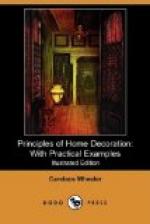LIST OF ILLUSTRATIONS
Dining-room in “Penny-royal” (Mrs. Boudinot Keith’s cottage, Onteora)
Hall in city house, showing effect of staircase divided and turned to rear
Stenciled borders for hall and bathroom decorations
Sitting-room in “Wild Wood,” Onteora (belonging to Miss Luisita Leland)
Large sitting-room in “Star Rock” (country
house of W.E. Connor, Esq.,
Onteora)
Painted canvas frieze and buckram frieze for dining-room
Square hall in city house
Colonial chairs and sofa (belonging to Mrs. Ruth McEnery Stuart)
Colonial mantel and English hob-grate (sitting-room
in Mrs. Candace
Wheeler’s house)
Sofa designed by Mrs. Candace Wheeler, for N.Y.
Library in “Woman’s
Building,” Columbia Exposition
Rustic sofa and tables in “Penny-royal”
(Mrs. Boudinot Keith’s cottage,
Onteora)
Dining-room in “Star Rock” (country house of W.E. Connor, Esq., Onteora)
Dining-room in New York house showing leaded-glass windows
Dining-room in New York home showing carved wainscoting and painted frieze
Screen and glass windows in house at Lakewood (belonging
to Clarence
Root, Esq.)
Principles of Home Decoration
CHAPTER I
DECORATION AS AN ART
“Who creates a Home, creates a potent spirit which in turn doth fashion him that fashioned.”
Probably no art has so few masters as that of decoration. In England, Morris was for many years the great leader, but among his followers in England no one has attained the dignity of unquestioned authority; and in America, in spite of far more general practice of the art, we still are without a leader whose very name establishes law.
It is true we are free to draw inspiration from the same sources which supplied Morris and the men associated with him in his enthusiasms, and in fact we do lean, as they did, upon English eighteenth-century domestic art—and derive from the men who made that period famous many of our articles of faith; but there are almost no authoritative books upon the subject of appropriate modern decoration. Our text books are still to be written; and one must glean knowledge from many sources, shape it into rules, and test the rules, before adopting them as safe guides.
Yet in spite of the absence of authoritative teaching, we have learned that an art dependent upon other arts, as decoration is upon building and architecture, is bound to follow the principles which govern them. We must base our work upon what has already been done, select our decorative forms from appropriate periods, conform our use of colour to the principles of colour, and be able to choose and apply all manufactures in accordance with the great law of appropriateness. If we do this, we stand upon something capable of evolution and the creation of a system.




